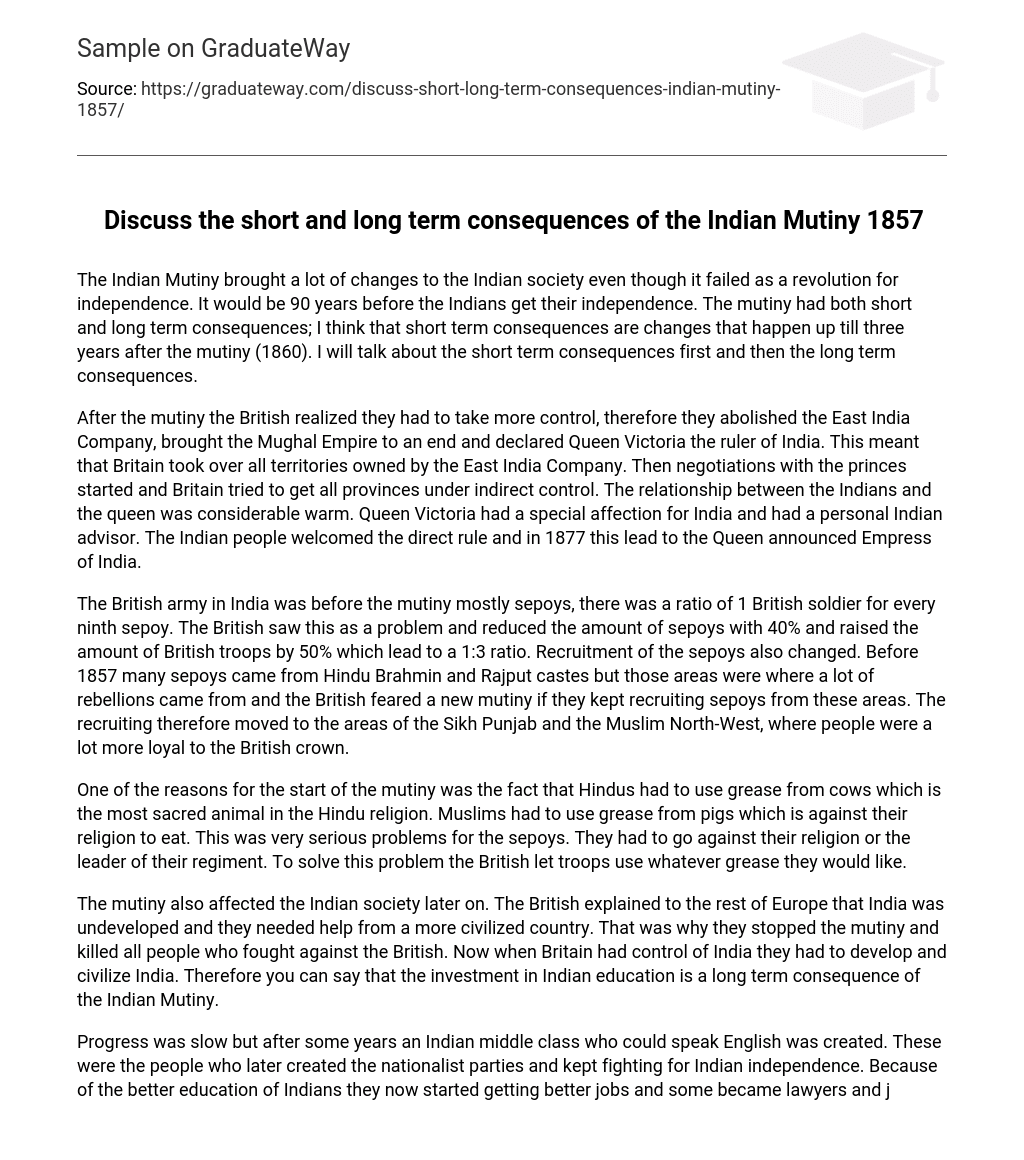Despite its failure as an independence revolution, the Indian Mutiny had a profound impact on Indian society. However, it would be another 90 years before India finally gained independence. This mutiny resulted in both immediate and long-lasting effects, with the short-term consequences occurring until 1860 and subsequently followed by the long-term ones.
After the uprising, the British took various actions to gain more control. They dissolved the East India Company and ended the Mughal Empire. Queen Victoria was then appointed as the ruler of India, including all territories previously owned by the East India Company. Negotiations were also started with Indian princes to establish indirect control over all provinces. Queen Victoria maintained a friendly relationship with the Indian people, even employing an Indian advisor personally. The direct rule imposed by Britain was well-received by Indians, resulting in Queen Victoria being declared Empress of India in 1877.
Prior to the mutiny, the British army in India was primarily made up of sepoys. The ratio was one British soldier for every ninth sepoy. To address this, the British reduced the number of sepoys by 40% and increased the number of British troops by 50%. This resulted in a new ratio of 1:3. Additionally, changes were implemented in the recruitment process for sepoys. Previously, many sepoys were recruited from Hindu Brahmin and Rajput castes, but these regions experienced multiple rebellions. To prevent another mutiny, the British decided to focus on recruiting from Sikh Punjab and Muslim North-West areas where loyalty to the British crown was stronger.
One factor behind the mutiny was that Hindus were required to handle cow grease, a sacred animal in their religion, while Muslims had to handle pig grease, which goes against their religious beliefs. This posed a significant dilemma for the sepoys as they had to betray either their religion or their regiment leader. To address this issue, the British authorities permitted the troops to choose whichever type of grease they preferred to use.
The Indian Mutiny had further repercussions on Indian society as the British conveyed to Europe that India was an underdeveloped nation requiring assistance from a more advanced country. Consequently, they suppressed the uprising and executed individuals who opposed them. Upon assuming authority over India, the British recognized the need for modernization and improvement in the country. Hence, it can be contended that the establishment of educational institutions in India is a lasting consequence of the Indian Mutiny.
Over time, progress led to the emergence of a middle class in India who spoke English. This middle class played a vital role in establishing nationalist parties and fighting for Indian independence. The improved education also provided Indians with better job opportunities like becoming lawyers and judges. The Ilbert bill was introduced as a recognition of their qualifications being equal to the British, but the British authorities refused to follow these rules, clearly indicating that they did not consider Indians as equals. Naturally, this deeply offended Indians and fueled nationalist sentiments, eventually leading to the creation of the congress.
The Indian Mutiny marked the first attempt for independence, instilling within the Indian population a sense of aspiration and willingness to fight for freedom. However, this aspiration also gave rise to various challenges. One of the major concerns was who would govern if independence were achieved. To address this issue, the Hindus established the Congress as their political organization, while the Muslims formed the all-India Muslim League. However, these political bodies initially faced difficulties in selecting candidates and lacked representation in the British government. It was not until the implementation of the 1909 Indian Councils act that they were allocated seats in the legislative councils, based on factors such as organization affiliation, religion, and college attendance.
In 1907, congress divided as the moderates were concerned about repeating the earlier failed mutiny. However, they were willing to negotiate and believed that attaining home rule would bring India closer to independence in the distant future. This led to the formation of two home rule parties in 1916, led by leaders Tilak and Besant, who achieved significant success.
However, the British did not consider home rule as an option. The radicals were prepared to stage another mutiny and wanted to take direct action to demonstrate their discontent with British rule. A group of these radicals established the Ghadr movement, which released a publication in North America explicitly expressing their opposition to British rule in India. Concerned about the possibility of a new mutiny, the British swiftly executed 47 leaders and detained around 200 individuals associated with the movement. This effectively quelled the smaller local mutinies.
The Lucknow pact, signed in December 1916, was a result of the long-lasting impact of the 1857 Mutiny. This mutiny triggered aspirations for independence in various religious and political factions. Both Muslims and Hindus were striving for independence, but they were also in conflict with each other, each desiring power and authority in a future independent India. However, in 1916, they realized that collaborating would yield greater and faster results. They strategized the distribution of power across different provinces. Former adversaries in India were now unified and prepared for independence through their joint efforts.
Britain, having lost power in WWI, also lost the respect of Indians who had fought in the war. These Indians saw that Britain was no different from India in terms of civilization. Consequently, Britain could no longer justify ruling India under the guise of the white man’s burden. Although Britain relied on the resources provided by India, they were gradually losing control over an increasingly independent nation. This ultimately resulted in the Amritsar massacre.





